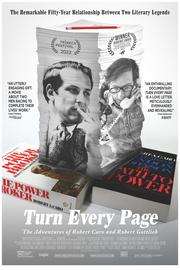 We love ARCs. Even as the transition continues to digital galleys and the ARC as book object gradually relinquishes its magical domain, we remain addicted to glimpses of the future, especially when we experience a shock of recognition with a book--what Flaubert called "the strength of the punches it has given you and the time it takes you to recover from them."
We love ARCs. Even as the transition continues to digital galleys and the ARC as book object gradually relinquishes its magical domain, we remain addicted to glimpses of the future, especially when we experience a shock of recognition with a book--what Flaubert called "the strength of the punches it has given you and the time it takes you to recover from them."
I feel the same buzz with "movie ARCs," otherwise known as screeners, when I get to see them. This happened a couple of times last year: in the spring with A.B. Zax's doc Hello, Bookstore, a wonderful portrait of bookseller Matt Tannenbaum and the Bookstore in Lenox, Mass.; and then again in early December when I was given the opportunity to have an early look at Turn Every Page: The Adventures of Robert Caro and Robert Gottlieb.
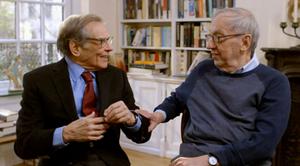
|
|
| Robert Caro & Robert Gottlieb (photo courtesy Sony Pictures Classics) |
|
Directed by Gottlieb's daughter, Lizzie Gottlieb (Today's Man, Romeo Romeo), Turn Every Page explores the extraordinary relationship between two literary legends as they race to complete their life's work. Caro and Gottlieb have worked and fought together for 50 years, forging one of publishing's most iconic and productive partnerships. At 87, Caro is now working to complete the final volume of his masterwork, The Years of Lyndon Johnson, while Gottlieb, 91, is waiting to edit it. The proverbial clock is ticking.
Turn Every Page opened December 30 in New York and Los Angeles. I hope it will find wider theater distribution soon, as well as VOD availability. If reading a great ARC prompts a bookseller to want to shout "You've got to read this!" months before publication, then seeing the Turn Every Page screener made me want to yell 'You've got to see this!' " with the same handselling fervor.
Stay tuned, as they say.
"My father... has been the editor in chief of Simon and Schuster, Knopf and the New Yorker," Lizzie Gottlieb observed in her director's statement. "He has been the long-time editor of writers such as Toni Morrison, Joseph Heller, Doris Lessing, Bill Clinton, John Le Carré, and Salman Rushdie. One of his most complicated, celebrated and mysterious relationships is with the writer Robert Caro. I wanted to make this film to try to understand a wildly productive, oddly contentious, hugely important collaboration, and through that, to open a window into a secretive creative process, a vanishing world of book publishing, and the way truths about power in America are revealed."
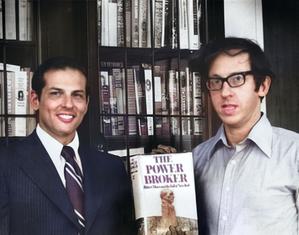
|
|
| The "two Bobs" in their youth. (photo courtesy Sony Pictures Classics)
|
|
With humor and insight, this portrait of two great minds in a kind of mutually sustaining orbit around each other is the rarest of gifts for booklovers. We see their work habits and personality quirks, as well as professional challenges and triumphs, from the meticulous crafting of Caro's The Power Broker through the first four LBJ volumes, and now toward the culmination of a quest that has had an impact on generations of politicians, activists, writers and readers.
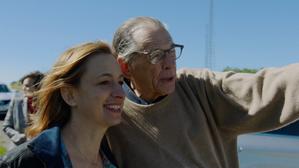
|
|
| Lizzie Gottlieb & Caro (photo courtesy Sony Pictures Classics) |
|
Lizzie Gottlieb noted that her personal relationship with each of the men "is embedded into the film. My father and I interact informally. In contrast, the dynamic with Caro starts on a formal note, then grows more personal as trust is built. Caro is a man with limited time and strict rules around self-representation. There is a push-pull to Caro--he is resistant to cameras entering the private sanctum of his work space, but gradually allows me into his process. My father is also resistant--he is dismissive of the importance of his story, uninterested in talking about legacy, and doesn't see the value in hashing out erstwhile arguments. But he, too, slowly relents, and then speaks poignantly--about aging and legacy and life. His words speak to larger issues of what we all hope to leave behind."
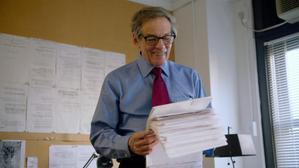 |
|
| Caro at work. (photo courtesy Sony Pictures Classics) |
|
Gottlieb has been filming "the two Bobs" for five years, and said she "recently apologized to Robert Caro for taking so long to finish the film. He closed his eyes for a long time, then looked at me with great intensity and said, 'Lizzie. It's not about how long it takes to make. It's about whether it will endure.' "
Turn Every Page is an incisive portrayal of two brilliant, intense, driven and focused intellects. One of the scenes that has stayed with me since watching it (twice) is a moment of calm. It occurs at the Lyndon Johnson Presidential Library in Austin, Tex., where Caro and his wife, author/researcher Ina Caro, ascend the grand staircase as if they are in a cathedral. They settle in a research room, at side-by-side desks, to resume the Borgesian task of poring over boxes of Johnson's papers, the end of which they may never see. It is a sacred moment of bookish grace.
As the publishing world and Caro's devoted readers await the final volume, "the stakes for him to finish become higher and higher," Lizzie Gottlieb said. "The possibility that he might not finish, and that Gottlieb might not get to edit it, looms over every scene. I wanted to capture the delicate power balance between them, the steadfast dedication to craft, collaboration, and the incredible industriousness with which they approach the process of writing and editing. I wanted to really understand what it takes to create something that changes how people understand power, and that will endure."

